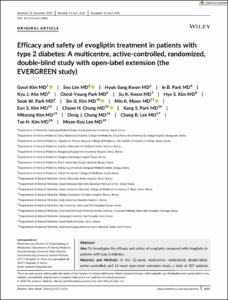KUMEL Repository
1. Journal Papers (연구논문)
1. School of Medicine (의과대학)
Dept. of Internal Medicine (내과학)
Efficacy and safety of evogliptin treatment in patients with type 2 diabetes: A multicentre, active-controlled, randomized, double-blind study with open-label extension (the EVERGREEN study)
- Affiliated Author(s)
- 김혜순
- Alternative Author(s)
- Kim, Hye Soon
- Journal Title
- Diabetes, obesity & metabolism
- ISSN
- 1463-1326
- Issued Date
- 2020
- Keyword
- continuous glucose monitoringdipeptidyl peptidase-4 inhibitorevogliptinglycaemic; variabilitylinagliptintype 2 diabetes
- Abstract
- Aim:
To investigate the efficacy and safety of evogliptin compared with linagliptin in patients with type 2 diabetes.
Materials and Methods:
In this 12‐week, multicentre, randomized, double‐blind, active‐controlled, and 12‐week open‐label extension study, a total of 207 patients with type 2 diabetes who had HbA1c levels of 7.0%‐10.0% were randomized 1: 1 to receive evogliptin 5 mg (n = 102) or linagliptin 5 mg (n = 105) daily for 12 weeks. The primary efficacy endpoint was the change from baseline HbA1c at week 12. The secondary endpoint was the change in the mean amplitude of glycaemic excursion (MAGE) assessed by continuous glucose monitoring. In the extension study conducted during the following 12 weeks, evogliptin 5 mg daily was administered to both groups: evogliptin/evogliptin group (n = 95) and linagliptin/evogliptin group (n = 92).
Results:
After 12 weeks of treatment, the mean change in HbA1c in the evogliptin group and in the linagliptin group was −0.85% and −0.75%, respectively. The between‐group difference was −0.10% (95% CI: −0.32 to 0.11), showing non‐inferiority based on a non‐inferiority margin of 0.4%. The change in MAGE was −24.6 mg/dL in the evogliptin group and −16.7 mg/dL in the linagliptin group. These values were significantly lower than the baseline values in both groups. However, they did not differ significantly between the two groups. In the evogliptin/evogliptin group at week 24, HbA1c decreased by −0.94%, with HbA1c values of <7.0% in 80.2% of the patients. The incidence and types of adverse events were comparable between the two groups for 24 weeks.
Conclusion:
In this study, the glucose‐lowering efficacy of evogliptin was non‐inferior to linagliptin. It was maintained at week 24 with a 0.94% reduction in HbA1c. Evogliptin therapy improved glycaemic variability without causing any serious adverse events in patients with type 2 diabetes.
- Department
- Dept. of Internal Medicine (내과학)
- Publisher
- School of Medicine (의과대학)
- Citation
- Gyuri Kim et al. (2020). Efficacy and safety of evogliptin treatment in patients with type 2 diabetes: A multicentre, active-controlled, randomized, double-blind study with open-label extension (the EVERGREEN study). Diabetes, obesity & metabolism, 22(9), 1527–1536. doi: 10.1111/dom.14061
- Type
- Article
- ISSN
- 1463-1326
- Appears in Collections:
- 1. School of Medicine (의과대학) > Dept. of Internal Medicine (내과학)
- 파일 목록
-
-
Download
 oak-2020-0281.pdf
기타 데이터 / 881.37 kB / Adobe PDF
oak-2020-0281.pdf
기타 데이터 / 881.37 kB / Adobe PDF
-
Items in Repository are protected by copyright, with all rights reserved, unless otherwise indicated.